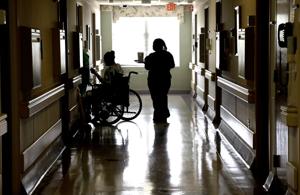
News
August 28, 2025
‘The most vulnerable’: Rural, inner city communities brace for impacts of Trump's Medicaid cuts
Hospitals and medical providers serving rural and lower-income communities are on edge after President Donald Trump’s mega bill passed by Congress includes looming Medicaid cuts.
Rural and inner-city communities are bracing for significant challenges as hospitals and medical providers serving these vulnerable populations face the prospect of substantial Medicaid cuts following the passage of a sweeping bill by Congress. The legislation, championed by President Donald Trump, has left many concerned about the future of healthcare access for some of the nation's most at-risk individuals.
Medicaid, a vital government program, provides healthcare coverage to millions of low-income Americans, including children, pregnant women, seniors, and people with disabilities. For rural and inner-city communities, where poverty rates are often higher and access to private insurance is limited, Medicaid serves as a crucial lifeline. The looming cuts threaten to destabilize healthcare systems that already operate on thin margins.
Hospitals in rural areas, often the sole providers of medical care for miles, are particularly vulnerable. These facilities rely heavily on Medicaid reimbursements to stay afloat. Reduced funding could force them to scale back services, lay off staff, or even close their doors entirely, leaving residents with limited or no access to emergency care, specialized treatment, or even basic check-ups.
Inner-city communities face similar challenges. Safety-net hospitals and community health centers, which cater primarily to Medicaid recipients, are bracing for a potential decrease in funding. This could lead to longer wait times for appointments, reduced availability of essential services, and increased strain on already overburdened healthcare professionals.
The exact impact of the Medicaid cuts remains uncertain, but healthcare advocates and community leaders are expressing deep concern. They fear that the cuts will exacerbate existing health disparities, widen the gap between the haves and have-nots, and ultimately jeopardize the health and well-being of the most vulnerable members of society. Discussions are already underway to explore potential strategies to mitigate the effects of the funding reductions and ensure that essential healthcare services remain accessible to those who need them most. The coming months will be critical in determining the long-term consequences of these cuts and the steps communities will take to protect their residents' health.
Medicaid, a vital government program, provides healthcare coverage to millions of low-income Americans, including children, pregnant women, seniors, and people with disabilities. For rural and inner-city communities, where poverty rates are often higher and access to private insurance is limited, Medicaid serves as a crucial lifeline. The looming cuts threaten to destabilize healthcare systems that already operate on thin margins.
Hospitals in rural areas, often the sole providers of medical care for miles, are particularly vulnerable. These facilities rely heavily on Medicaid reimbursements to stay afloat. Reduced funding could force them to scale back services, lay off staff, or even close their doors entirely, leaving residents with limited or no access to emergency care, specialized treatment, or even basic check-ups.
Inner-city communities face similar challenges. Safety-net hospitals and community health centers, which cater primarily to Medicaid recipients, are bracing for a potential decrease in funding. This could lead to longer wait times for appointments, reduced availability of essential services, and increased strain on already overburdened healthcare professionals.
The exact impact of the Medicaid cuts remains uncertain, but healthcare advocates and community leaders are expressing deep concern. They fear that the cuts will exacerbate existing health disparities, widen the gap between the haves and have-nots, and ultimately jeopardize the health and well-being of the most vulnerable members of society. Discussions are already underway to explore potential strategies to mitigate the effects of the funding reductions and ensure that essential healthcare services remain accessible to those who need them most. The coming months will be critical in determining the long-term consequences of these cuts and the steps communities will take to protect their residents' health.
Category:
Politics